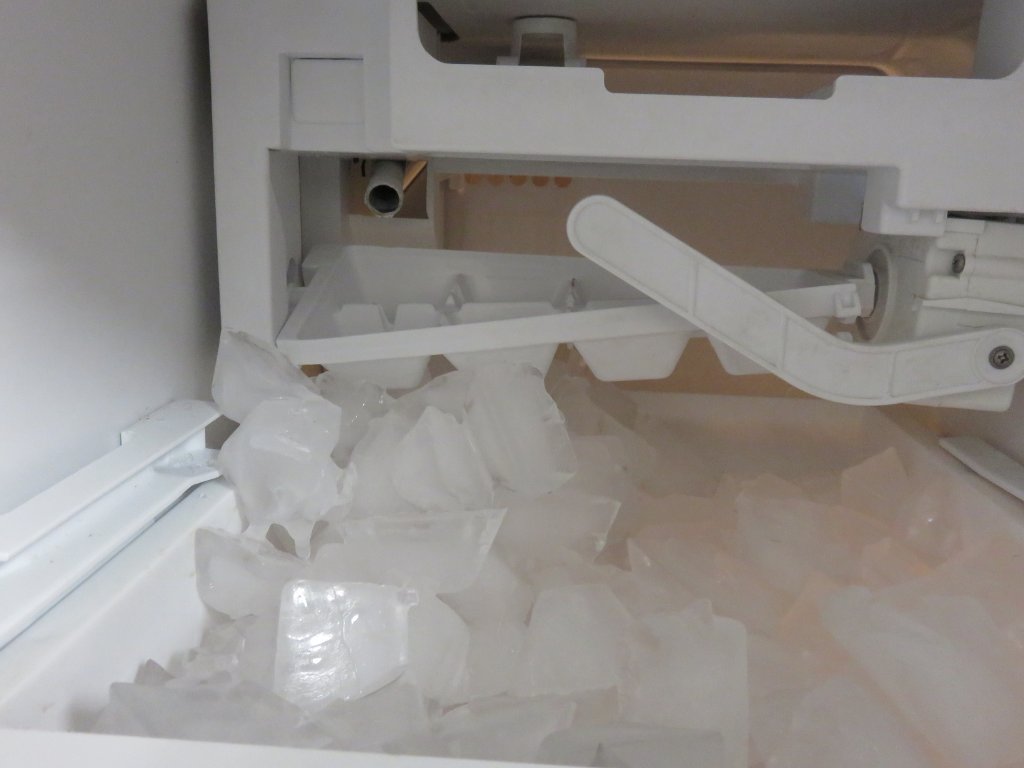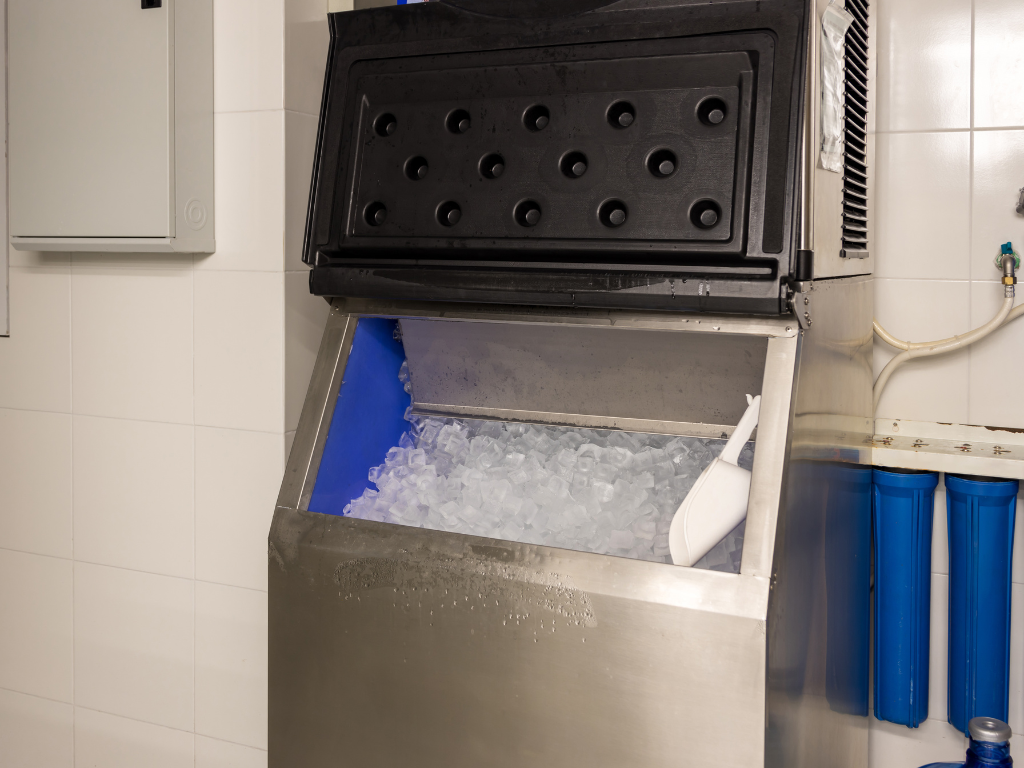In the realm of ice production, a diverse range of ice machines is available, each designed to meet specific needs. Ice machines are broadly categorized based on their intended environment and usage intensity: commercial or residential. It is observed that commercial ice machines are primarily utilized in settings like restaurants, bars, and hospitals, where a large volume of ice is required consistently.
On the other hand, residential ice machines are found in homes and are designed to meet the needs of individual households. The understanding of the primary uses of both types of machines is essential for potential users to make an informed decision that aligns with their demands for ice production and storage.
Commercial Ice Machines
Commercial ice machines are recognized as heavy-duty equipment that is capable of producing ice on a large scale. These machines are integrated with advanced features and technologies to ensure they meet the rigorous demands of commercial environments. Key attributes include enhanced durability, higher production capacities, and the ability to create various ice shapes and sizes.
It is often seen that commercial ice machines are employed in environments such as restaurants, hotels, and healthcare facilities, where the rapid availability of ice is critical to daily operations.
Residential Ice Machines

Residential ice machines are identified as smaller, more compact units when compared to their commercial counterparts. The differences in size, capacity, and design are significant, with residential models being tailored to fit within domestic kitchen spaces and designed to meet lower ice production requirements.
The best use cases for home ice machines are typically linked to personal convenience, entertainment, and leisure activities where the volume of ice needed is relatively modest. These machines are often appreciated for their ease of use and the comfort they bring to home entertainment and daily living.
Considerations for Choosing Between Commercial and Residential Ice Machines
Considerations for Choosing Between Commercial and Residential Ice Machines
When deciding between commercial and residential ice machines, several important considerations must be taken into account to ensure that the chosen model meets the specific needs of the user.
Assessing Your Ice Production Needs
An accurate assessment of daily ice usage is crucial. Commercial establishments typically require a significant amount of ice for various purposes throughout the day, while residential needs are generally much lower.
Space and Installation Requirements
The available space and the complexity of installation play a significant role in decision-making. Commercial ice machines often require a dedicated area and professional installation, whereas residential models are designed for standard kitchen spaces with simpler installation needs.
Cost Comparison and Budget Considerations
Budget constraints are a practical concern. Commercial machines represent a larger investment upfront due to their size, capacity, and durability. Residential machines are more budget-friendly but come with limited features and capacities.
Tabulated Information:
| Consideration | Commercial Ice Machines | Residential Ice Machines |
| Production Needs | High volume, continuous production | Lower volume, intermittent production |
| Space Requirements | Large dedicated space, complex installation | Compact, simple installation |
| Budget | Higher initial investment, operational costs | More affordable, lower operational costs |
| Installation Complexity | Professional installation required | DIY installation possible |
| Usage Frequency | Designed for constant, heavy use | Designed for occasional, light use |
| Ice Variety | Multiple types and sizes of ice | Usually one type and size of ice |
| Maintenance | Frequent, potentially more complex | Less frequent, typically simpler |
| Durability | Industrial-grade materials, longer lifespan | Less robust, shorter lifespan |
| Energy Consumption | Higher due to size and output | Lower, more energy-efficient options |
| Future Scaling | Can handle increased demand | May need to upgrade with increased need |
Cost Comparison and Budget Considerations
A comparison of costs is conducted to align with budgetary constraints. Commercial ice machines are recognized for their higher upfront cost, attributed to their larger size and increased capacity. In contrast, residential machines are generally more affordable, reflecting their smaller size and lower production capabilities.
Benefits and Limitations of Residential Ice Machines
-
The Convenience of Having an Ice Maker at Home
The presence of an ice maker in the home setting is celebrated for the unrivaled convenience it provides. Families enjoy the luxury of an on-demand supply of ice for daily use, from cooling beverages to managing minor injuries. The addition of an ice machine for sale in the home appliance market has made access to these conveniences more widespread, offering a range of models that cater to varying household needs.
-
Limitations in Capacity and Output for Residential Models
Despite the benefits, it is acknowledged that residential ice machines have their limitations. They typically do not match the output levels of a commercial ice machine, offering smaller quantities of ice which may not suffice for large social gatherings or frequent entertaining. For households with greater ice needs, this may necessitate additional planning or even alternative refrigeration solutions to meet their requirements.
-
Navigating Ice Machine Repair and Maintenance
Homeowners are advised that residential ice machines, while smaller and less complex than commercial variants, still require regular maintenance. When ice machine repair is needed, it’s essential to engage with professionals who specialize in refrigeration solutions to ensure longevity and optimal performance of the equipment.
Maintenance and Upkeep
Maintenance Differences Between Commercial and Residential Ice Machines
The frequency and intensity of maintenance required for commercial ice machines are recognized as being higher compared to residential units. In commercial settings, due to the heavy usage, it is advised that a regular maintenance schedule be established to ensure optimal performance and hygiene standards. Residential ice machines are typically subjected to less stringent maintenance routines, reflecting their lighter usage and the less demanding operational environment.
Longevity and Durability Concerns
Concerns regarding the longevity and durability of ice machines are often raised. Commercial units are constructed with industrial-grade materials to withstand the rigors of frequent use, whereas residential machines are designed for less frequent use and may not have the same lifespan under heavy usage conditions.
Making the Decision
Factors to Finalize the Decision on Which Ice Machine to Purchase
Several factors are taken into consideration when finalizing the purchase of an ice machine. These include the anticipated ice usage, available space, budget constraints, and specific ice type requirements. The assessment of these factors is crucial in determining the most suitable ice machine for the purchaser’s needs.
Future-Proofing Your Ice Machine Investment
It is recommended that considerations regarding future needs also be incorporated into the decision-making process. This foresight involves evaluating the potential for business growth, changes in ice consumption patterns, and advancements in ice machine technology.
Conclusion
In summary, the decision between commercial and residential ice machines is influenced by a variety of factors, including the intended volume of ice production, space constraints, budget, and maintenance considerations. The durability and potential future needs of the business or household also play significant roles.

